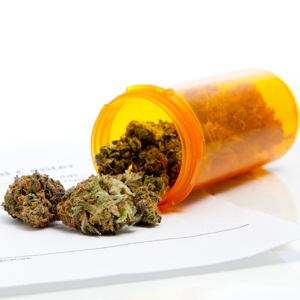
States that have legalised medical marijuana tend to experience an unexpected benefit – fewer overdose deaths from narcotic painkillers, a new study suggests.
Access to medical marijuana is associated with 25 percent fewer prescription drug overdose deaths each year compared to states where medical pot is illegal, according to findings published in JAMA Internal Medicine.
What's more, states that pass medical marijuana laws see their overdose death rates decrease dramatically in the years immediately afterward, researchers reported.
The study authors believe that people suffering from chronic pain tend to rely on medical marijuana when they have that option, which reduces the risk of addiction and overdose that accompanies use of narcotic medications.
"We think that people with chronic pain may be choosing to treat their pain with marijuana rather than with prescription painkillers, in states where this is legal," said lead author Dr. Marcus Bachhuber, a researcher with the Centre for Health Equity Research and Promotion at the Philadelphia Veterans Affairs Medical Centre.
But some experts caution against drawing conclusions from the study.
"I don't know what to make of the paper. I'd be very, very careful saying that medical marijuana laws decrease risk of opiate [narcotic] overdose," said Dr. Bradley Flansbaum, a hospitalist at Lenox Hill Hospital in New York City. "It's a very loose association."
Overdose death rates skyrocketing
The study used data from the U.S. Centres for Disease Control and Prevention to determine the prescription painkiller overdose death rate for each state between 1999 and 2010, and then took into account whether and when each state had passed a medical marijuana law.
Overdose deaths from prescription painkillers have skyrocketed over the past two decades, increasing 118 percent between 1999 and 2011, according to the CDC.
The agency estimates that every day 113 people die from drug overdoses in the United States, and another 6,700 land in the emergency room from an overdose.
Currently, 23 states allow medical marijuana to ease chronic pain and other conditions.
Read: Children getting poisoned by medical marijuana
The researchers reviewed death certificates from all states between 1999 and 2010, when 13 states had legalised marijuana.
Since 2010, another 10 states and Washington, D.C., have adopted similar laws, the researchers said.
While overdose deaths have risen in all states, Bachhuber and his colleagues found that the annual average number of deaths caused by painkillers is nearly 25 percent less in states with medical marijuana laws.
"In absolute terms, states with a medical marijuana law had about 1,700 fewer opioid painkiller overdose deaths in 2010 than would be expected based on trends before the laws were passed," Bachhuber said.
Medical marijuana law affects death rates
States' overdose death rates decline an average 20 percent in the first year following the passage of a medical marijuana law, the researchers found. By the second year, overdose death rates on average decline 25 percent, and as much as 33 percent by five years after legalisation of medical pot.
Medical marijuana laws also are associated with a more dramatic decrease in overdose death rates than other means commonly used to tackle prescription drug abuse, the study noted.
For example, prescription drug monitoring programmes are associated with an average 3.7 percent increase in overdose deaths, compared with a 24.8 percent decline associated with medical pot legalisation, according to the study.
Increased state oversight of pain management clinics is associated with a 7.6 percent decline in overdose deaths, while laws requiring patients to show ID when picking up a prescription are associated with a 5 percent increase in overdose deaths, the study authors found.
Marijuana doesn't kill you
Bachhuber cautioned that the exact mechanism underlying these study results is unclear, and that the findings don't prove a direct cause-and-effect relationship between medical marijuana laws and overdose deaths.
Flansbaum agreed. Although he called the paper "provocative" and "stimulating", he said it doesn't prove that medical marijuana reduces drug overdoses.
"There are so many things going on in states, whether it be cultural or through laws, it's hard to say what's the effect of the medical marijuana law versus everything else that's happening," Flansbaum said. "You don't know what causes what. The data is not that clean."
Read: Dagga for pets in pain, says vet
But these findings support previous studies that showed people who receive a prescription for medical marijuana tend to reduce the amount of other pain medications they use, said John Thomas, a health law expert and professor at the Quinnipiac University School of Law in Hamden, Conn.
There are some concerns that those patients might start abusing their medical marijuana, as they would a prescription painkiller, Thomas added.
"The good news about that is that marijuana doesn't tend to kill you, and it isn't as physically addictive as other medication," he said.
Read more:
Marijuana in a pill?
Legalising pot may cause more problems
Image: Medical marijuana from Shutterstock
See breaking news and the hottest health tips before anybody else by joining South Africa’s biggest and best health community, like health24 on Facebook now!




 Publications
Publications
 Partners
Partners










